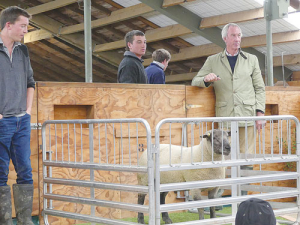Move over ham, here comes lamb
It’s official, lamb will take centre stage on Kiwi Christmas tables this year.
 Is that a hint of a smile? Blair Gallagher and his son Hamish (far left) look on as the bidding for Lot 19 heads to $15,000, thought to be a NZ record for a crossbred ram lamb.
Is that a hint of a smile? Blair Gallagher and his son Hamish (far left) look on as the bidding for Lot 19 heads to $15,000, thought to be a NZ record for a crossbred ram lamb.
The introduction of the Beltex breed to the New Zealand sheep industry is off to a flying start: the breed’s inaugural sale drew a price believed to be a New Zealand record for any crossbred ram lamb.
The sale of ram lambs, both purebred and cross, was held at Blair Gallagher’s Rangiatea farm, near Mount Somers, Mid-Canterbury, on March 23. The top price of $15,000 and the second-to-top price of $12,500 were both paid for Beltex-Suffolk crosses.
Beltex, or Belgian Texel, is known for its characteristically heavy hindquarters and outstanding kill weights.
The breed has been brought to NZ by a partnership formed by Gallagher, former Invermay head Dr Jock Allison and farm advisor John Tavendale and their families. They imported purebred Beltex in the form of frozen embryos from the UK, as well as semen put into Gallagher’s Suffolk, Poll Dorset and Perendale flocks.
At least 300 people attended the sale, with buyers hailing from as far afield as Northland and Southland.
The sale saw offerings of 16 purebred Beltex, 18 Beltex X Suffolk, 22 Beltex X Poll Dorset and 10 Beltex X Perendale ram lambs.
Of the purebred Beltexes, the top price of $12,000 went to a late replacement. This was an animal Gallagher was intending to keep, but it was included in the sale after a withdrawal of another ram forced by injury. The other purebreds went for $2500 to $8000.
The top price for the Poll Dorset crosses was $2800 and top price for the Perendale crosses was $2000.
The buyers of the thought-to-be record-setting $15,000 lamb are a loose syndicate of Guy Martin, from Lincoln; Grant Black, Timaru; and George Williams of Grassendale Genetics, Tinui.
Martin said he and Black had been swapping genetics for 10 years. They had stabilised a SufTex (Suffolk-Texel) line, which he says is why a pure Beltex would not add a lot, but the ram they bought “fits straight into our programme”.
“We’re producing meaty rams,” Martin told Rural News. “We’ve got good structure, good feet and good muscle already, so if these [Beltex] can add to that we’ll definitely use them.
“They’ve got a tremendous hind-quarter,” said Black. “We just want to see new blood and new genetics.”
Allison said the lowish price for the purebreds was “a bit of a surprise” but the Suffolk-cross prices were way ahead of expectations.
“That would be the most expensive crossbred sheep ever sold in NZ, I would think. I would be surprised if it wasn’t. And the next one was probably the second best. Overall it was a very good sale.”
Gallagher called the high price “pretty amazing”.
“We had expectated the pures would be higher than they were; that’s where we invested our money. But the potential to breed is in the crosses so that’s obviously played out in the pricing.”
Gallagher said the importation would continue this year, with more purebred embryos coming in from the UK, from four different studs and six different sires.
A New Zealand dairy industry leader believes the free trade deal announced with India delivers wins for the sector.
The Coalition Government will need the support of at least one opposition party to ratify the free trade deal with India.
Primary sector leaders have welcomed the announcement of a Free Trade Agreement between India and New Zealand.
At Pāmu’s Kepler Farm in Manapouri, mating has wrapped up at the across-breed Beef Progeny Test.
More than 150 people turned up at Parliament recently to celebrate the 20th anniversary of Horticulture New Zealand (HortNZ).
Biosecurity New Zealand says Kiwis should continue to keep an eye out for yellow-legged hornets (Vespa velutina) over the holiday season.